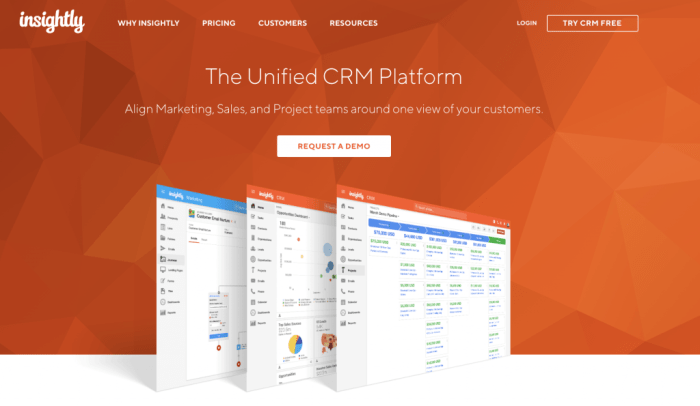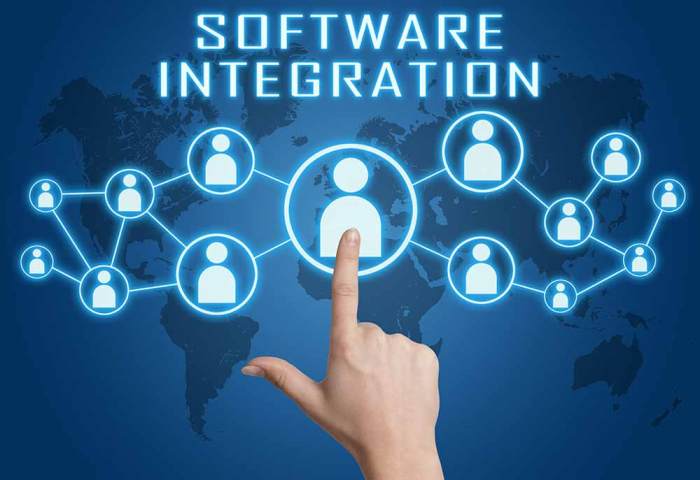Project management software with crm – In today’s dynamic business landscape, efficient project management and robust customer relationship management (CRM) are no longer optional but essential for success. Integrating these two critical functions through specialized software offers a significant competitive advantage, streamlining workflows, improving team collaboration, and ultimately driving revenue growth. This article delves into the powerful synergy of project management software and CRM, exploring their individual functionalities, the benefits of integration, and key considerations for selecting the right solution for your business needs.
Understanding Project Management Software
Project management software serves as a centralized hub for planning, executing, monitoring, and controlling projects. These platforms typically offer a range of features designed to enhance productivity and efficiency. Key functionalities include:
Core Features of Project Management Software:, Project management software with crm
- Task Management: Creating, assigning, prioritizing, and tracking tasks, often with features like Gantt charts, Kanban boards, and calendar views.
- Collaboration Tools: Facilitating communication and collaboration among team members through features like file sharing, messaging, and video conferencing.
- Time Tracking: Monitoring time spent on tasks and projects to improve resource allocation and project budgeting.
- Reporting and Analytics: Generating reports on project progress, resource utilization, and overall performance.
- Risk Management: Identifying and mitigating potential risks that could impact project success.
- Workflow Automation: Automating repetitive tasks to free up time for more strategic work.
Popular examples of project management software include Asana, Trello, Monday.com, Jira, and Microsoft Project. Each platform offers a unique set of features and caters to different project management methodologies (Agile, Waterfall, etc.).
Understanding CRM Software
Customer Relationship Management (CRM) software is designed to manage and analyze customer interactions and data throughout the customer lifecycle. This helps businesses improve customer satisfaction, increase sales, and build stronger relationships. Key features include:
Core Features of CRM Software:
- Contact Management: Storing and organizing customer information, including contact details, communication history, and purchase history.
- Sales Management: Tracking leads, managing sales pipelines, and forecasting sales revenue.
- Marketing Automation: Automating marketing tasks such as email campaigns, social media posting, and lead nurturing.
- Customer Service Management: Managing customer inquiries, resolving issues, and tracking customer satisfaction.
- Reporting and Analytics: Providing insights into customer behavior, sales performance, and marketing effectiveness.
- Integration Capabilities: Connecting with other business applications to streamline workflows.
Examples of leading CRM platforms include Salesforce, HubSpot, Zoho CRM, and Microsoft Dynamics 365. The choice of CRM depends on factors like business size, industry, and specific needs.
The Power of Integrating Project Management Software with CRM
Integrating project management software with CRM creates a powerful synergy, enabling businesses to gain a holistic view of their operations and improve efficiency across departments. This integration allows for:

Source: teamwave.com
Key Benefits of Integration:
- Improved Customer Communication: Seamlessly share project updates and relevant information with clients, fostering transparency and enhancing satisfaction.
- Enhanced Collaboration: Streamline communication between sales, marketing, and project teams, improving collaboration and reducing bottlenecks.
- Better Project Tracking: Link projects to specific customers, providing a clear view of project progress and its impact on customer relationships.
- Increased Sales Opportunities: Identify new sales opportunities based on project performance and customer feedback.
- Improved Resource Allocation: Optimize resource allocation by linking project needs to customer requirements and sales forecasts.
- Data-Driven Decision Making: Leverage integrated data to make informed decisions about project prioritization, resource allocation, and customer engagement.
Choosing the Right Integrated Solution
Selecting the right project management software with CRM integration requires careful consideration of several factors:
Factors to Consider:
- Business Needs: Identify your specific requirements for project management and CRM functionalities.
- Integration Capabilities: Ensure seamless data exchange and synchronization between the project management and CRM systems.
- Scalability: Choose a solution that can grow with your business and adapt to changing needs.
- Budget: Consider the cost of the software, implementation, and ongoing maintenance.
- User-Friendliness: Select a solution that is intuitive and easy for your team to use.
- Vendor Support: Ensure that the vendor provides reliable technical support and documentation.
Frequently Asked Questions (FAQ)
- Q: What are the benefits of integrating project management and CRM? A: Integration improves customer communication, enhances collaboration, provides better project tracking, increases sales opportunities, optimizes resource allocation, and enables data-driven decision-making.
- Q: How does CRM integration improve project management? A: CRM integration provides valuable customer context to projects, enabling better prioritization and resource allocation based on customer value and needs.
- Q: What are some examples of project management software that integrate with CRM? A: Many platforms offer integrations, including Salesforce, HubSpot, Zoho CRM, and Microsoft Dynamics 365, which can integrate with various project management tools.
- Q: Is it necessary to integrate project management and CRM? A: While not strictly mandatory for all businesses, integration significantly enhances efficiency and provides a competitive edge for organizations managing complex projects and customer relationships.
- Q: What are the potential challenges of integrating project management and CRM? A: Potential challenges include data migration issues, integration complexity, and the need for adequate training for users.
References
Call to Action: Project Management Software With Crm
Ready to unlock the power of integrated project management and CRM? Contact us today for a consultation to explore how we can help you streamline your workflows, improve customer relationships, and drive business growth.
Question Bank
What are the key benefits of integrating project management and CRM?
Improved communication, streamlined workflows, enhanced client relationships, better resource allocation, and data-driven decision-making.
How much does project management software with CRM integration typically cost?
Pricing varies widely depending on the specific software, features, and number of users. It’s best to contact vendors directly for accurate quotes.
What are some examples of popular project management software with CRM integration?
Many CRM platforms (Salesforce, HubSpot) offer native project management features or integrate with dedicated project management tools (Asana, Monday.com, Trello).

Source: watkyn.com
Is it difficult to implement project management software with CRM integration?
Implementation complexity varies depending on the chosen software and existing systems. Many vendors offer onboarding and support to facilitate a smooth transition.
How can I measure the success of my project management software with CRM integration?
Track key metrics such as project completion rates, client satisfaction scores, resource utilization, and overall business profitability.
